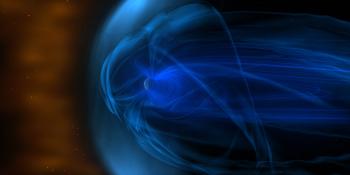Viewing archive of Thursday, 17 May 2012
Solar activity report
Any mentioned solar flare in this report has a scaling factor applied by the Space Weather Prediction Center (SWPC). Because of the SWPC scaling factor, solar flares are reported as 42% smaller than for the science quality data. The scaling factor has been removed from our archived solar flare data to reflect the true physical units.
Report of Solar-Geophysical Activity 2012 May 17 2200 UTCPrepared by the NOAA © SWPC and processed by SpaceWeatherLive.com
Joint USAF/NOAA Report of Solar and Geophysical Activity
SDF Number 138 Issued at 2200Z on 17 May 2012IA. Analysis of Solar Active Regions and Activity from 16-2100Z to 17-2100Z Solar activity was at high levels due to an M5/1f flare
at 17/0147Z that occurred from Region 1476 (N12W89) as it was
approaching the west limb. Associated with the flare was Type II
(645 km/s) and IV radio sweeps as well as a partial halo CME with an
estimated plane-of-sky speed of approximately 1200 km/s. The
majority of the ejecta was directed off the west limb as seen in
SOHO/LASCO C3 imagery beginning at 17/0206Z, however a shock
enhancement in the interplanetary magnetic field is expected from
the event. Further analysis is pending.
IB. Solar Activity Forecast
Solar activity is expected to be at
predominantly low levels with a slight chance for M-class activity
for all three days of the period (18 - 20 May).
IIA. Geophysical Activity Summary 16-2100Z to 17-2100Z
The geomagnetic field was at quiet to active levels. An isolated
active period was observed during the 16/2100Z - 2400Z period due to
a prolonged southward period of the Bz component of the
interplanetary magnetic field. A >10 MeV and >100 MeV proton event
at geosynchronous orbit was observed associated with the M5 flare.
The >10 MeV event began at 17/0210Z, crossed the 100 pfu threshold
(S2) at 17/0245Z, reached a max of 255 pfu at 17/0430Z, and fell
below 100 pfu at 17/0945Z. The greater than 100 MeV proton event
began at 17/0200Z and reached a max of 20.4 pfu. Both events were
still in progress at the time of this report.
IIB. Geophysical Activity Forecast
The geomagnetic field is
expected to be mostly quiet during the first half of day 1 (18 May).
Around mid to late on day 1, a shock arrival is expected from the
partial halo CME associated with the 17 May M5 flare. Active to
minor storm conditions are expected. Early on day 2 (19 May),
unsettled to active conditions are expected, returning to quiet to
unsettled levels by the end of the day. Quiet to unsettled
conditions are expected on day 3 (20 May).
III. Event Probabilities 18 May to 20 May
| Class M | 20% | 10% | 10% |
| Class X | 05% | 01% | 01% |
| Proton | 70% | 20% | 05% |
| PCAF | yellow | ||
IV. Penticton 10.7 cm Flux
Observed 17 May 136 Predicted 18 May-20 May 135/135/135 90 Day Mean 17 May 115
V. Geomagnetic A Indices
Observed Afr/Ap 16 May 008/009 Estimated Afr/Ap 17 May 006/006 Predicted Afr/Ap 18 May-20 May 011/015-010/008-007/005
VI. Geomagnetic Activity Probabilities 18 May to 20 May
| A. Middle Latitudes | |||
|---|---|---|---|
| Active | 35% | 30% | 10% |
| Minor storm | 25% | 15% | 05% |
| Major-severe storm | 10% | 05% | 01% |
| B. High Latitudes | |||
|---|---|---|---|
| Active | 35% | 35% | 15% |
| Minor storm | 40% | 25% | 10% |
| Major-severe storm | 15% | 10% | 05% |
All times in UTC
Latest news
Latest forum messages
Ask your obscure/"stupid" space weather questions. 391AR 14079 36Power transmission for all of us. And why I believe we are better prepared than ever for major solar events 26AR 4065 14AR 4078 1
More topicsSupport SpaceWeatherLive.com!
A lot of people come to SpaceWeatherLive to follow the Sun's activity or if there is aurora to be seen, but with more traffic comes higher server costs. Consider a donation if you enjoy SpaceWeatherLive so we can keep the website online!

Space weather facts
| Last X-flare | 2025/03/28 | X1.1 |
| Last M-flare | 2025/04/30 | M1.9 |
| Last geomagnetic storm | 2025/04/21 | Kp5+ (G1) |
| Spotless days | |
|---|---|
| Last spotless day | 2022/06/08 |
| Monthly mean Sunspot Number | |
|---|---|
| March 2025 | 134.2 -20.4 |
| April 2025 | 125.7 -8.5 |
| Last 30 days | 126.6 -0.4 |


